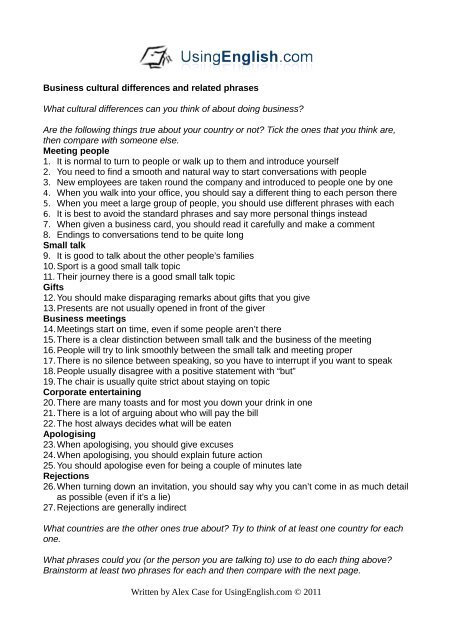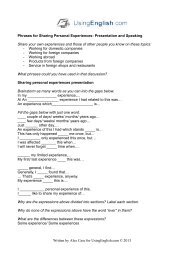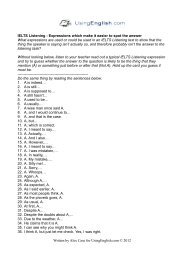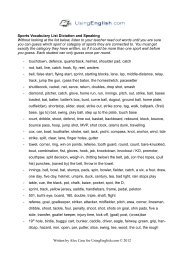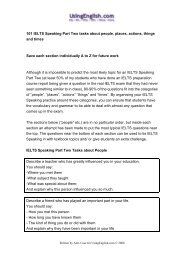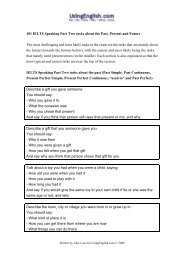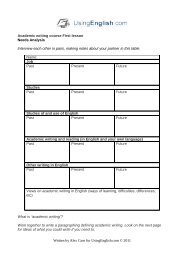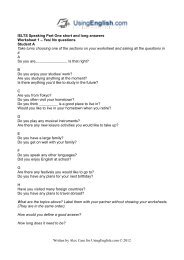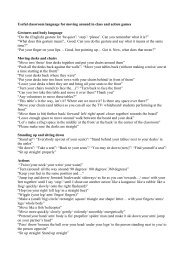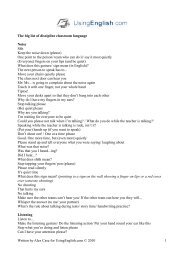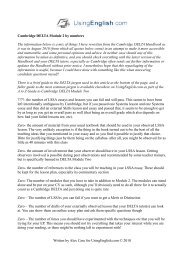Business English- Cultural Differences
Business English- Cultural Differences
Business English- Cultural Differences
Create successful ePaper yourself
Turn your PDF publications into a flip-book with our unique Google optimized e-Paper software.
<strong>Business</strong> cultural differences and related phrases<br />
What cultural differences can you think of about doing business?<br />
Are the following things true about your country or not? Tick the ones that you think are,<br />
then compare with someone else.<br />
Meeting people<br />
1. It is normal to turn to people or walk up to them and introduce yourself<br />
2. You need to find a smooth and natural way to start conversations with people<br />
3. New employees are taken round the company and introduced to people one by one<br />
4. When you walk into your office, you should say a different thing to each person there<br />
5. When you meet a large group of people, you should use different phrases with each<br />
6. It is best to avoid the standard phrases and say more personal things instead<br />
7. When given a business card, you should read it carefully and make a comment<br />
8. Endings to conversations tend to be quite long<br />
Small talk<br />
9. It is good to talk about the other people’s families<br />
10.Sport is a good small talk topic<br />
11. Their journey there is a good small talk topic<br />
Gifts<br />
12.You should make disparaging remarks about gifts that you give<br />
13.Presents are not usually opened in front of the giver<br />
<strong>Business</strong> meetings<br />
14.Meetings start on time, even if some people aren’t there<br />
15.There is a clear distinction between small talk and the business of the meeting<br />
16.People will try to link smoothly between the small talk and meeting proper<br />
17.There is no silence between speaking, so you have to interrupt if you want to speak<br />
18.People usually disagree with a positive statement with “but”<br />
19.The chair is usually quite strict about staying on topic<br />
Corporate entertaining<br />
20.There are many toasts and for most you down your drink in one<br />
21.There is a lot of arguing about who will pay the bill<br />
22.The host always decides what will be eaten<br />
Apologising<br />
23.When apologising, you should give excuses<br />
24.When apologising, you should explain future action<br />
25.You should apologise even for being a couple of minutes late<br />
Rejections<br />
26.When turning down an invitation, you should say why you can’t come in as much detail<br />
as possible (even if it’s a lie)<br />
27.Rejections are generally indirect<br />
What countries are the other ones true about? Try to think of at least one country for each<br />
one.<br />
What phrases could you (or the person you are talking to) use to do each thing above?<br />
Brainstorm at least two phrases for each and then compare with the next page.<br />
Written by Alex Case for Using<strong>English</strong>.com © 2011
Meeting people<br />
1. It is normal to turn to people or walk up to them and introduce yourself – “Please allow<br />
me to introduce myself…” “Hi, I’m John”<br />
2. You need to find a smooth and natural way to start conversations with people – “Is<br />
anyone sitting here?” “Is this the right room for…?” “I see you are also…”<br />
3. New employees are taken round the company and introduced to people one by one –<br />
“You’ll also need to know who… is” “This is John. It’s his first day today” “I’ll<br />
take you round and introduce you to a few people I think you need to know”<br />
“This is Steve Smith. He starts tomorrow/ He is the replacement for…/ He’ll be<br />
taking…’s position” “Now I’ll take you over to meet…”<br />
4. When you walk into the office, you should say a different thing to each person there –<br />
“Morning” “How’s it going?” “How was your weekend?”<br />
5. When you meet a large group of people, you should use different phrases with each –<br />
“Pleased to meet you” “How’s it going?” “It’s really nice to meet you”<br />
6. It is best to avoid the standard phrases and say more personal things instead – “It’s so<br />
nice to finally meet you” “I’ve heard so much about you” “A colleague told me<br />
that you’d be here” “You’re much younger than I expected”<br />
7. When given a business card, you should read it carefully and make a comment –<br />
“Your office is quite close to ours” “Systems Engineer? Does that mean that<br />
you…?”<br />
8. Endings to conversations tend to be quite long – “Well, I’ll let you get on” “I can see<br />
you’re very busy, so…”<br />
Small talk<br />
9. It is good to talk about the other people’s families – “How’s your son getting on at<br />
school?” “Pass on my regards to…”<br />
10.Sport is a good small talk topic – “Did you see the (…) match?” “How did your team<br />
do?” “Bad luck on Saturday”<br />
11.Their journey there is a good small talk topic – “Did you have any trouble finding<br />
us?” “How was your flight?” “Was my map okay?” “How were the roads?”<br />
Gifts<br />
12.You should make disparaging remarks about gifts that you give – “This is just a little<br />
something that I picked up at the airport” “Don’t get too excited!”<br />
13.Presents are not usually opened in front of the giver – “I’ll open it later, if you don’t<br />
mind” “Can I open it now?”<br />
Written by Alex Case for Using<strong>English</strong>.com © 2011
<strong>Business</strong> meetings<br />
14.Meetings start on time, even if some people aren’t there – “Well, let’s get started and<br />
we can fill latecomers in when they arrive”<br />
15.There is a clear distinction between small talk and the business of the meeting – “Let’s<br />
get down to business, shall we?” “Right, let’s get started”<br />
16.People will try to link smoothly between the small talk and meeting proper – “That<br />
brings me on to…” “… which ties in nicely with why we are here today, which<br />
is…”<br />
17.There is no silence between speaking, so you have to interrupt if you to speak – “Can I<br />
just..?” “Can I come in here?” “I have something to say on that point”<br />
18.People usually disagree with a positive statement with “but” – “I can see why you<br />
might think that, but…” “I respect your opinion, but…” “That’s a good point,<br />
but…”<br />
19.The chair is usually quite strict about staying on topic – “Can we leave that until<br />
AOB?” “I think that is the topic for another meeting”<br />
Corporate entertaining<br />
20.There are many toasts and for most you down your drink in one – “I’d like to propose<br />
a toast.” “Bottoms up” “(Let’s drink) to…” “Please raise your glasses to…”<br />
21.There is a lot of arguing about who will pay the bill – “No, please allow me” “I insist”<br />
“You paid last time” “It’s my turn to pay”<br />
22.The host always decides what will be eaten – “What do you recommend?” “I’ll have<br />
whatever you’re having” “I don’t know this kind of food, so I’d rather you chose”<br />
Apologising<br />
23.When apologising, you should give excuses – “… this was because/ due to …”<br />
24.When apologising, you should explain future action – “It won’t happen again” “I’ll be<br />
more careful next time”<br />
25.You should apologise even for being a couple of minutes late – “Sorry, the lifts were<br />
really busy” “Sorry, I couldn’t get a client off the phone”<br />
Rejections<br />
26.When turning down an invitation, you should say why you can’t come in as much detail<br />
as possible (even if it’s a lie) – “I have to meet my boss at just that time” “I’ll be out<br />
of the country that week and won’t be back till late Friday”<br />
27.Rejections are generally indirect – “I’ll think about it” “I’ll ask around and get back<br />
to you”<br />
Reply to some of the phrases above, then do the same but extending the conversation.<br />
Do the same, but this time with your partner explaining the situation rather than saying the<br />
phrase and you starting the conversation.<br />
Written by Alex Case for Using<strong>English</strong>.com © 2011


